

Walter Lippmann. Early life[edit] Career[edit] Lippmann was a journalist, a media critic and an amateur philosopher who tried to reconcile the tensions between liberty and democracy in a complex and modern world, as in his 1920 book Liberty and the News.
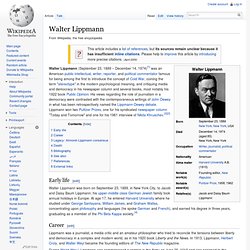
In 1913, Lippmann, Herbert Croly, and Walter Weyl became the founding editors of The New Republic magazine. During World War I, Lippmann was commissioned a captain in the Army on June 28, 1918 and was assigned to the intelligence section of the AEF headquarters in France. He was assigned to the staff of Colonel Edward M. Through his connection to Colonel House, he became an adviser to President Woodrow Wilson and assisted in the drafting of Wilson's Fourteen Points speech. Walter Lippmann in 1914 It was Lippmann who first identified the tendency of journalists to generalize about other people based on fixed ideas.
Though a journalist himself, he did not assume that news and truth are synonymous. Manufacturing Consent: The Political Economy of the Mass Media. Government and news media[edit] Editorial distortion is aggravated by the news media’s dependence upon private and governmental news sources.
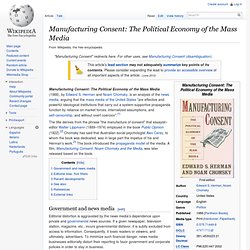
If a given newspaper, television station, magazine, etc., incurs governmental disfavor, it is subtly excluded from access to information. Consequently, it loses readers or viewers, and ultimately, advertisers. To minimize such financial danger, news media businesses editorially distort their reporting to favor government and corporate policies in order to stay in business. Editorial bias: five filters[edit] Herman and Chomsky's "propaganda model" describes five editorially distorting filters applied to news reporting in mass media: Size, Ownership, and Profit Orientation: The dominant mass-media outlets are large firms which are run for profit.
Recent developments[edit] Manufacturing Consent: Noam Chomsky and the Media. Manufacturing Consent: Noam Chomsky and the Media (1992) is a documentary film that explores the political life and ideas of Noam Chomsky, a linguist, intellectual, and political activist.
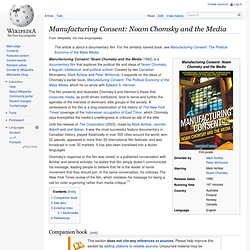
Created by two Canadian filmmakers, Mark Achbar and Peter Wintonick, it expands on the ideas of Chomsky's earlier book, Manufacturing Consent: The Political Economy of the Mass Media, which he co-wrote with Edward S. Herman. The film presents and illustrates Chomsky's and Herman's thesis that corporate media, as profit-driven institutions, tend to serve and further the agendas of the interests of dominant, elite groups in the society.
A centerpiece of the film is a long examination of the history of The New York Times' coverage of the Indonesian occupation of East Timor, which Chomsky says exemplifies the media's unwillingness to criticize an ally of the elite. Noam Chomsky: Manufacturing Consent 1 of 9. Manufacturing Consent - Noam Chomsky - 1/17. Manufacturing Consent - Noam Chomsky - 2/17. Manufacturing Consent - Noam Chomsky - 3/17. Manufacturing Consent - Noam Chomsky - 4/17. Manufacturing Consent - Noam Chomsky - 5/17. Manufacturing Consent - Noam Chomsky - 6/17. Manufacturing Consent: Noam Chomsky and the Media. Noam Chomsky - Manufacturing consent (Parte 1) on Vimeo. Manufacturing Consent: The Political Economy of the Mass Media. Framing (social sciences) In the social sciences, framing is a set of concepts and theoretical perspectives on how individuals, groups, and societies organize, perceive, and communicate about reality.
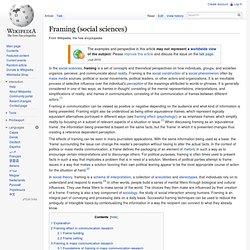
Framing is the social construction of a social phenomenon often by mass media sources, political or social movements, political leaders, or other actors and organizations. Manufacturing Consent on Vimeo. Who owns what. Blood on their Hands: Media Framing of the Afghan War Diary Leaks. How Canada's corporate media framed the Occupy movement. The Occupy movement occupied two parallel, rarely intersecting universes in the corporate media.
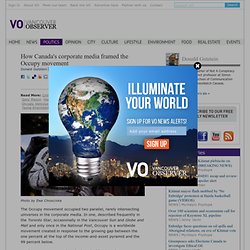
In one, described frequently in the Toronto Star, occasionally in the Vancouver Sun and Globe and Mail and only once in the National Post, Occupy is a worldwide movement created in response to the growing gap between the one percent at the top of the income-and-asset pyramid and the 99 percent below. In the Occupy universe largely described by the other papers, Occupy is little more than a rag-tag bunch of ne’er-do-wells with vague—but nevertheless invalid—goals who need to get a job.
Such a characterization may not be surprising given that almost all newspapers are owned by card-carrying members of the one percent. Psywar - Full Documentary. Project Censored. Project Censored. Project Censored is a media research, education, and advocacy initiative housed at Sonoma State University since 1976.
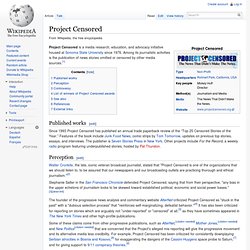
Among its journalistic activities is the publication of news stories omitted or censored by other media sources.[1] Published works[edit] Science of coercion: communication ... - Christopher Simpson. Profile Christopher Simpson. 6 Corporate Media Giants Control Majority of Mainstream News. How a Famous ‘NYT’ Reporter Led the Media Cover-Up of Radiation Dangers
September 7, 2011 · 2 Comments Source: The Nation.
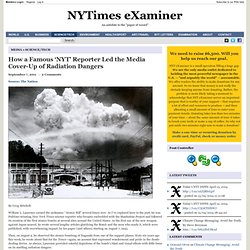
Greg Mitchell (@GregMitch) sur Twitter. Julian Assange on The New York Times: Part 8 December 28, 2011 · 0 Comments Source: NYTX Special Fundraising Offer: Donate to receive a remastered version of this series.
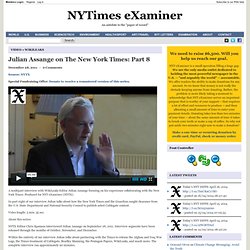
Wag the Dog. The film was released just prior to the Lewinsky scandal and the subsequent bombing of the Al-Shifa pharmaceutical factory in Sudan by the Clinton Administration.[3] Plot[edit] The plan's setbacks, including an error in seizing a criminally insane Army prison convict (Harrelson) to be a "hero" who was "shot down behind enemy lines," do not disturb Motss, who repeatedly claims "this is nothing" while comparing the situation to past movie-making catastrophes he averted.
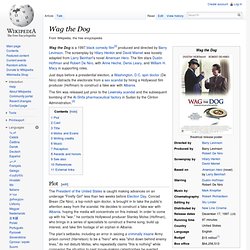
In the end, with the president re-elected, everything seems fine until Motss finds out that the media are crediting the president's win to a tired campaign slogan of "Don't change horses in mid-stream" rather than Motss's hard work. Motss announces that he only did this for "the credit" and will call the media to "set them straight," despite Brean's warning that he is "playing with his life. " Motss refuses to back down, so Brean reluctantly has him killed and makes it look as if he had a heart attack. Cast[edit] Title[edit] Colbert Bush Roast Transcript - Stephen Colbert Bush Transcript. Following is the transcript of Stephen Colbert's comedy routine at the 2006 White House Correspondents' Dinner (video available here): Thank you, ladies and gentlemen.
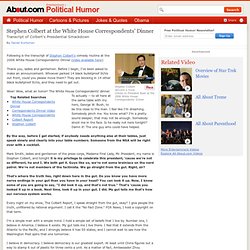
Before I begin, I've been asked to make an announcement. Whoever parked 14 black bulletproof SUVs out front, could you please move them? Speech at the White House Correspondent's Dinner (2006) p1. Should The NYT Be a Truth Vigilante? Widely Cited. Clay Shirky: NYT's public editor's very public utterance. Thursday, Arthur Brisbane, the public editor of the New York Times, went to his readers with a question: "I'm looking for reader input on whether and when New York Times news reporters should challenge 'facts' that are asserted by newsmakers they write about. " Brisbane (who, as public editor, speaks only for himself, not the Times) referred to two recent stories: the claim that Clarence Thomas had "misunderstood" a financial reporting form when he left out key information, and Mitt Romney's assertion that President Obama gives speeches "apologising" for America.
Brisbane asked whether news reporters should have the freedom to investigate and respond to those comments. The reaction from readers was swift, voluminous, negative and incredulous. "Is this a joke? "If the purpose of the NYT is to be an inoffensive container for ad copy, then by all means continue to do nothing more than paraphrase those press releases. " JayRosen: So whaddaya think: should we put truthtelling back up there at number one?
Jan.12 Somewhere along the way, telling truth from falsehood was surpassed by other priorities to which the press felt a stronger duty. Arthur Brisbane, public editor of the New York Times, was unaware of this history when he asked users of the Times whether reporters should call out false statements. Brisbane’s post, Should The Times Be a Truth Vigilante? JayRosen: The View from Nowhere. Nov.10 “American journalism is dumber than most journalists, who often share my sense of absurdity about these practices. A major reason we have a practice less intelligent than its practitioners is the prestige that the View from Nowhere still claims…” After dismissing Mr. Glenn Greenwald: Arthur Brisbane and selective stenography. The New York Times‘ Public Editor Arthur Brisbane unwittingly sparked an intense and likely enduring controversy yesterday when he pondered — as though it were some agonizing, complex dilemma — whether news reporters “should challenge ‘facts’ that are asserted by newsmakers they write about.”
That’s basically the equivalent of pondering in a medical journal whether doctors should treat diseases, or asking in a law review article whether lawyers should defend the legal interests of their clients, etc.: reporting facts that conflict with public claims (what Brisbane tellingly demeaned as being “truth vigilantes”) is one of the defining functions of journalism, at least in theory.
Subsequent attempts to explain what he meant, along with a response from the NYT‘s Executive Editor, Jill Abramson, will only add fuel to the fire. Message Machine - Behind TV Analysts, Pentagon’s Hidden Hand - Series. Top Secret America. From the Editors - The Times and Iraq - Sidebar. Wag the Dog (1997) - Trailer. Moderne tijd dringt moeizaam door tot mediaredacties. Wetenschap13 januari 2012 8:00 |De angst onder journalisten om hun journalistieke autonomie te verliezen is vaak groter dan hun wil om het publiek en de kritiek die er bestaat op hun functioneren serieus te nemen.
Dat zegt communicatiewetenschapper Yael de Haan in haar proefschrift ‘Between professional autonomy and public responsibility. Accountability and responsiveness in Dutch media and journalism’, waarop zij gisteren promoveerde. De laatste jaren lijkt de kritiek op media en journalistiek in Nederland toe te nemen, constateert De Haan, werkzaam bij de Amsterdam School of Communication Research (ASCoR) en als mediadeskundige lid van de Raad voor de Journalistiek.
Uit zowel publieke als politieke hoek krijgen zij het verwijt feiten te overdrijven, hypes te creëren en misbruik te maken van hun macht. De Haan onderzocht hoe Nederlandse media hebben gereageerd op de kritiek op hun functioneren. Toch blijkt de journalistieke praktijk weerbarstig, zo stelt De Haan. Het zijn net mensen. Murdoch and power: why Leveson is looking in the wrong place. Like many hacks, I’ve done very little work this morning, because I’ve been glued to the live feed from the Leveson Inquiry. Why? Because the Dirty Digger, aka Rupert Murdoch, has been giving evidence under oath. Jeremy Hunt visited News Corp in US as Murdochs considered BSkyB bid. Rupert Murdoch: Brown “declared war” on News Corp. GlennGreenwald: “Officials say” journalism. CNN journalist: don’t be nosy. LZ Granderson is a regular CNN columnist and contributor, and has written a column this week that — no joke — urges Americans to stop being so “nosy” about all the bad things the U.S.
Government does. You just have to read it to believe it: We are a nosy country. Though to be fair, it’s not entirely our fault. Between the 24/7 news cycle, social media and reality TV, we have been spoon fed other people’s private business for so long we now assume it’s a given to know everything. This was written by a journalist and published by a media outlet. We do not want to open Pandora’s Box, not about [Fast and Furious] and certainly not about a bunch of other potentially scandalous things the federal government has been involved with. . . . Theoccupiedtimes Editorial: October 2012. Secret manoeuvres in the Dark: Corporate and Police Spying on Activists. Spying on activists and disrupting their campaigns against the corporations has become a sinister growth industry.
Nick Davies: Our media have become mass producers of distortion. Here's a little example of what I call Flat Earth News. In June 2005, Fleet Street told its readers about a gang of feral child bullies who had attempted to murder a five-year-old boy by hanging him from a tree; the boy had managed to free himself. Nick Davies: 'Churnalism has taken the place of what we should be doing: Telling the truth'
UNSPEAK - an introduction. Glenn Greenwald and NY Times' Bill Keller Do Battle Over the Hidden Bias in Corporate News. Huffington kondigt 'World Post' aan: nieuws van 's werelds invloedrijksten - Tech & Media.